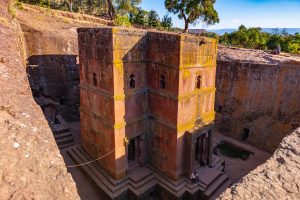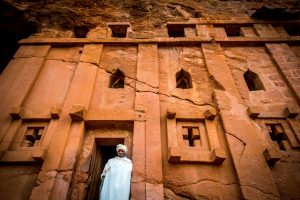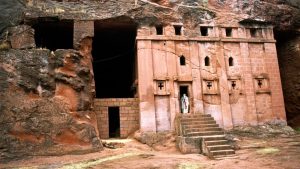Rock-hewn Churches of Lalibela
There are more than 1000 churches in the Lasta Region of Lalibela. Some churches are hidden caves, while eleven of these master ones are found in Lalibela town, previously known as Roha.
These eleven churches show brilliant engineering and architecture and are often named as the “Eighth wonder of the world”.
The Lalibela churches are amazing because of the fact that these towering structures were carved out of the solid, red tuff on which they stand and the location where they are built. Close examination is required to appreciate the full extent of the achievement.Lalibela is a secret marvel that was fashioned by a noble king, and maintains a special and lasting place in the life of the Ethiopian Christians, is clearly established.
Yemrehanna Kristos Monastery
Yemrehanna Kristos monastery is one of Ethiopia’s best-preserved late-Aksumite buildings, it is a rewarding cave church .This entirely inspiring and slightly unearthly complex sits within a cave roofed by basalt lava flows; the church’s exterior facade, created from alternating wood and stone layers. Yemrehanna Kristos may predate Lalibela’s churches by up to 78 years. Incredibly, the whole church sits on a foundation of carefully laid olive-wood panels, which ‘float’ it perfectly above the marshy ground. The carving and decoration are exceptional, especially the cruciform windows and the elaborate nave ceiling. Behind the church lies a pile of mummified bodies: some are those of pilgrims who’ve come here to die over the centuries; others are said to be those of the workmen. If you’re in the area on 10 October, the site gathers with pilgrims and is an unforgettable experience.
Asheton Maryam Church
Asheton Maryam monastery is located on the top of Abune Yosef mountain(3150m), this is the monastery where the local priests believe they’re ‘closer to heaven and God’, and it’s easy to see why, it’s the extraordinary mountain scenery for which you really come. The monastery’s construction is believed to date Lalibela’s and Na’akuto La’ab’s reigns, although local tradition claims it as King Lalibela’s first attempt at church construction.




